Think about this, you enter the island and you hear a correctional captain or lieutenant say: ‘next victim.
At our New York City June 2016 event, which focused on the notorious Rikers Island, storyteller Xena Grandichelli, opened her story with this harrowing line.
At Mass Story:Rikers Island June 26, 2016
Grandichelli, a trans-intersex woman and trans activist, was brutalized while she was detained at Rikers. Seven correctional officers and an incarcerated person beat and raped her while she was in their custody during the duration of December 30th, 2014 to January 3rd, 2015.
The police officers who had escorted Grandichelli to Rikers had proclaimed her a “troublemaker."
The frequency at which transgender individuals experience sexual violence is deeply alarming. According to the National Transgender Discrimination Survey report, 64% of respondents reported being sexually assaulted. More so, though, many trans people experience violence, like Grandichelli, while being detained in state and federal prisons. The U.S. Department of Justice reported that of their surveyed sample of transgender respondents (surveyed in 2011-12), 33.2% had reported another detainee had assaulted them and that 15.2% had been assaulted by a staff member while detained.
When officers returned to the island on January 3rd, Grandichelli had experienced significant injuries from the violence inflicted upon her. Despite needing medical attention, the officers waited and then transferred her to another section of the facility. Upon arrival, someone luckily acknowledged the extent of Grandichelli’s injuries and questioned her condition. She was then escorted to a hospital where a rape kit was conducted. She was sent back to Rikers Island and denied time to heal.
I still wasn’t healed because there was no such thing as talking to a rape counselor.
Sexual assault is not the only atrocity that transgender and/or gender non-conforming people must face while detained or incarcerated. While the Department of Justice now strongly suggests that a detainee’s gender identity is taken into account when placing them in a facility, detention centers are not required to do so. Thus, people like Grandichelli, who is a woman, can be placed in a men’s quarter or facility based on legal documents (i.e., birth certificates) or anatomical organs. Doing this could increase the likelihood that these marginalized people will experience sexual violence and/or physical violence by staff or other incarcerated people while they are detained or incarcerated.
In recent years, the mistreatment of trans people have become more known to the public. Notably, Chelsea Manning, who had released classified government documents to WikiLeaks, was denied access to hormone therapy by military prison officials for over a year. The details of her incarceration, which she and her attorneys have disclose, have helped reveal systematic problems in the way that transgender and gender non-conforming people are treated while being detained in prisons.
After a court case was opened, Grandichelli was released from Rikers. Yet, due to the violence inflicted upon her, she could not go home and was, instead, sent to the hospital.
She now works with the Sylvia Rivera Law Project which provides legal aid to those who have faced discrimination due to their gender identity.









